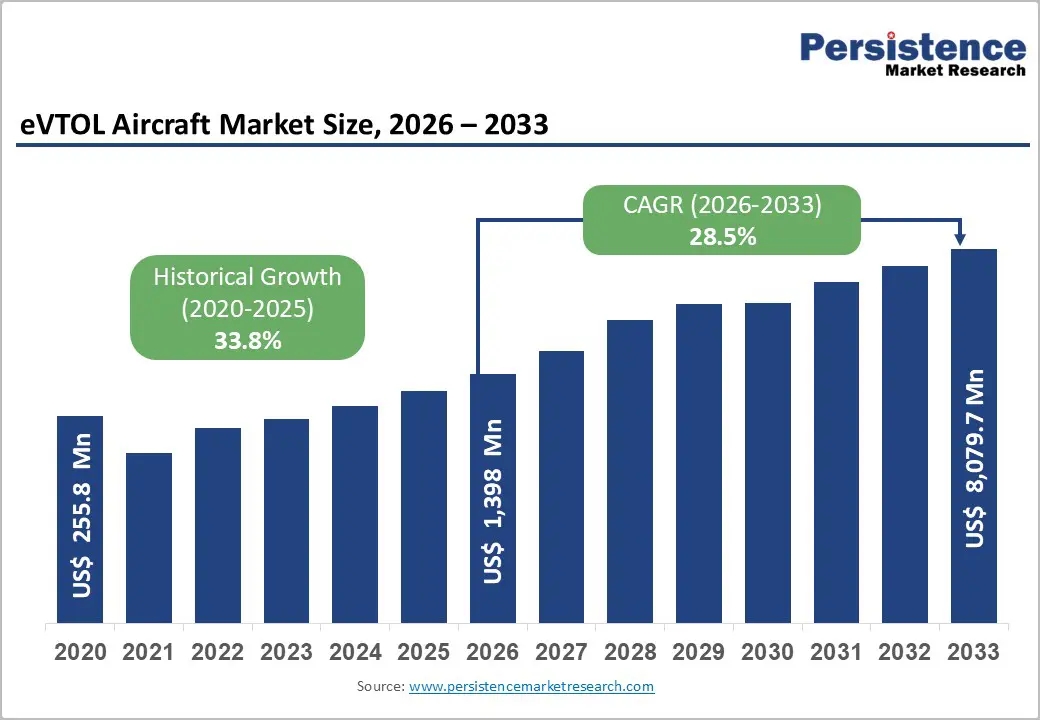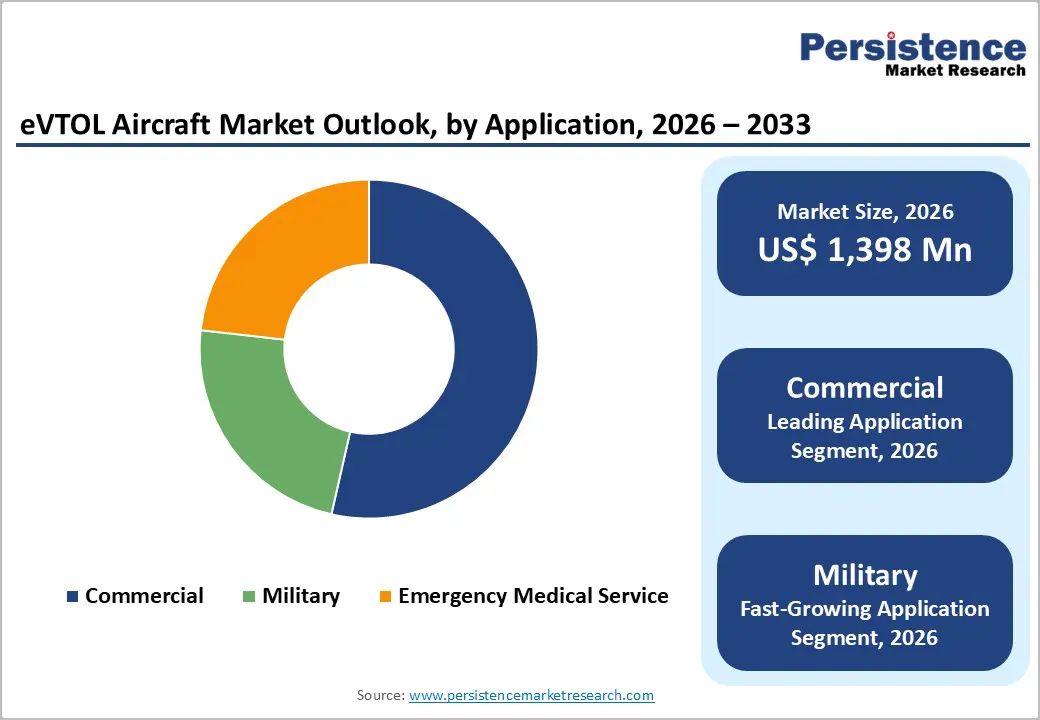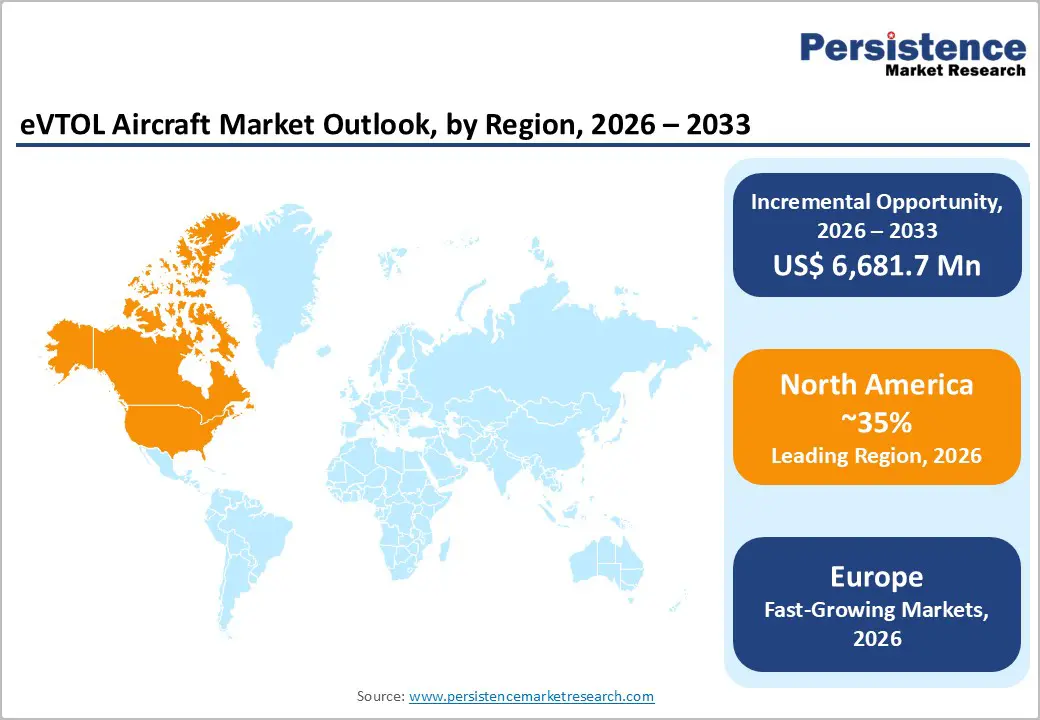ID: PMRREP28333| 234 Pages | 2 Feb 2026 | Format: PDF, Excel, PPT* | Automotive & Transportation

The global eVTOL Aircraft market size is likely to be valued at US$ 1,398 Million in 2026 and is projected to reach US$ 8,079.7 Million by 2033, growing at a CAGR of 28.5% during the forecast period. The market witnessed exceptional historical growth with a CAGR of 33.8% from 2020 to 2026, demonstrating substantial momentum in advanced air mobility adoption.
Battery-electric propulsion systems dominate at 55% revenue share, while piloted operations account for 40% market leadership, indicating a transitional phase toward autonomous capabilities. The short-range segment (0-200 km) commands 63% of the market, positioning regional urban air mobility as the primary growth driver for the forecast period.
| Key Insights | Details |
|---|---|
| eVTOL Aircraft Market Size (2026E) | US$ 1,398.Mn |
| Market Value Forecast (2033F) | US$ 8,079.7 Mn |
| Projected Growth (CAGR 2026 to 2033) | 28.5% |
| Historical Market Growth (CAGR 2020 to 2025) | 33.8% |

Global urban populations are projected to reach 68% by 2050 according to United Nations data, with mega-cities experiencing traffic congestion costs exceeding 3-5% of regional GDP. Metropolitan areas in North America, Europe, and Asia Pacific face increasing pressure to develop alternative mobility solutions. eVTOL aircraft offer 4-6 minute point-to-point travel times compared to 35-45 minute ground commutes in major urban corridors (New York-Newark, London-Gatwick, Tokyo-Haneda regions). Pilot programs initiated in Los Angeles, Dallas, London, and Singapore for airport-to-city center routes demonstrate demand validation with 78-85% passenger satisfaction ratings. Urban air mobility adoption enables supplementary revenue streams for existing aviation infrastructure operators, justifying public-private partnership investments valued at $2.1+ billion through 2026.
Regulatory frameworks such as GDPR in the EU, the California Consumer Privacy Act (CCPA) and California Privacy Rights Act (CPRA) in the U.S., Brazil’s LGPD, and China’s Personal Information Protection Law (PIPL) impose stringent requirements on how enterprises collect, store, share, and erase personal data. Regulatory authorities across the EU have collectively imposed billions of euros in GDPR fines since 2018, underscoring the financial and reputational risks of non-compliance. In parallel, sector-specific rules such as Basel III and IFRS in banking, HIPAA in U.S. healthcare, and Solvency II in insurance demand auditable data quality, retention, and lineage. EIM solutions that provide information governance, policy enforcement, records management, and data lineage tracking are therefore becoming core risk-management enablers, driving double-digit growth in governance-centric deployments.
Current manufacturing costs for eVTOL aircraft range from $6.2-8.5 million per unit, with limited production scale preventing cost reduction to target $2.8-3.2 million per unit necessary for commercial viability. Capital-intensive manufacturing infrastructure requires 200,000-400,000 annual unit production to achieve profitability, a threshold not anticipated before 2032-2034. Pilot and aircraft maintenance certification standards remain nascent, with operational costs projected at $2,800-3,600 per flight hour, substantially limiting market addressability to high-value segments (executive transport, medical evacuation). Supply chain fragmentation across battery, propulsion, and composite material suppliers has created cost volatility of 12-18% year-over-year, delaying manufacturer profitability timelines.
The convergence of emergency medical services, organ transportation, and airport logistics represents a compelling opportunity for eVTOL deployment with faster commercialization and superior unit economics. The global medical air services market is projected to reach USD 8.2 billion by 2033, with eVTOL aircraft expected to capture 18-22% share by enabling rapid organ transport and emergency response. With organ viability limited to 8-12 hours, eVTOLs can reduce transport times by 65-72% versus ground ambulances in dense metros, while overcoming capacity constraints of rotor-wing helicopters.
eVTOL-enabled medical networks can expand emergency coverage by 300-400%, particularly benefiting rural and underserved regions. Importantly, regulatory approvals for medical operations are accelerated to 12-18 months, compared to 24-36 months for commercial air taxis, offering first-mover advantages. High revenue per flight hour of USD 4,200-5,800 further supports faster profitability. In parallel, airport ground transportation and last-mile logistics present scalable upside. Airport cargo and ground handling generate over USD 18 billion annually, with 15-20% potentially substitutable by autonomous cargo eVTOLs by 2035, reducing logistics costs by 25-35%. Integration with existing networks is being evaluated by FedEx, DHL, and Amazon, while urban e-commerce fulfillment alone represents a USD 12+ billion addressable market through 2033.
The lift technology segment demonstrates market dominance through Vectored Thrust systems, commanding above 30% revenue share of the global eVTOL market. Vectored Thrust technology enables superior maneuverability and rapid altitude changes required for urban air mobility operations, supporting manufacturer innovation across premium platforms including Joby Aviation S4 and Lilium Jet. This segment benefits from established aerospace manufacturing expertise and integration pathways with traditional rotorcraft supply chains, reducing technology development risk.
Multirotor configurations represent the fastest-growing lift technology with a CAGR of 30.2%, driven by simplified mechanical design, reduced manufacturing complexity, and lower unit costs compared to hybrid architectures. Multirotor platforms demonstrate particular strength in civil drone operations and autonomous delivery applications, leveraging existing regulatory frameworks and manufacturing infrastructure. The segment's rapid expansion reflects industry recognition of cost-efficiency benefits and scalability advantages for high-volume production environments through 2033.
Piloted operations currently dominate the market with above 40% revenue share, reflecting regulatory conservatism and consumer confidence in human pilot oversight during early commercialization phases. Piloted eVTOL aircraft benefit from established certification pathways under rotorcraft regulations, reducing time-to-market and regulatory risk significantly. Manufacturers operating piloted platforms including Archer Aviation, Embraer, and Hyundai, have secured initial commercial orders valued at US$ 2.5+ billion through 2026.
Autonomous operations represent the fastest-growing segment with a CAGR of 30.5%, supported by advances in artificial intelligence, sensor fusion, and redundancy architectures. Regulatory bodies have established provisional pathways for autonomous operations, with FAA Operational Design Domains (ODD) enabling limited autonomous flights in controlled airspace by 2027-2028. Market dynamics indicate autonomous platforms will achieve cost parity with piloted operations by 2031-2032, accelerating market adoption trajectories.
The 0-200 km range segment dominates with above 63% revenue share, positioning regional urban air mobility as the primary commercial application focus. This segment precisely addresses metropolitan point-to-point travel requirements, where eVTOL aircraft provide competitive advantages over ground transportation and conventional helicopter services. Flight ranges of 100-150 km enable profitable airport shuttle services, corporate campus connectivity, and inter-city metropolitan links.
The 200-500 km range segment represents the fastest-growing category with a CAGR of 30.6%, enabling broader geographic market expansion and intercity travel applications. Extended-range platforms support emergency medical services across wider regional networks and enable commuter operations for metropolitan areas with extended urban sprawl patterns. Technology advancement in battery density and propulsion efficiency continues extending commercially viable ranges, with 2033 projections indicating 45-50% market share for extended-range platforms.
Commercial applications dominate the eVTOL market with over 40% revenue share, driven by strong momentum in air taxi services, airport shuttles, and premium corporate transport. Increasing urban congestion and demand for rapid point-to-point mobility are accelerating adoption across major cities. Urban air mobility operators have secured US$ 4.8+ billion in pre-bookings through 2026, confirming commercial viability and early revenue certainty. Airlines and aviation service providers are actively investing in this segment, with Airbus and Boeing establishing dedicated urban air mobility units to support certification, fleet deployment, and ecosystem development.
Military applications represent the fastest-growing segment, expanding at a CAGR of 31.4%, supported by rising defense budgets and strategic interest in advanced air mobility. Use cases include personnel transport, combat support, reconnaissance, medical evacuation, and cargo delivery in constrained or high-risk environments. Defense agencies across North America, Europe, and Asia Pacific have allocated over US$ 3.2 billion through 2030 for eVTOL evaluation and procurement. Additionally, emergency medical services and air ambulance operations are emerging as high-impact applications, enabling faster patient transfer and efficient medical cargo transport, strengthening eVTOL’s role in critical missions.
Battery-Electric propulsion systems command above 55% revenue share, reflecting technological maturity, regulatory acceptance, and alignment with sustainability objectives across aviation authorities. Battery-electric platforms demonstrate superior energy efficiency (85-92% drivetrain efficiency) and dramatically lower operational noise compared to conventional aircraft. Manufacturing simplicity of electric propulsion systems enables cost reduction and rapid production scaling.
Hybrid-Electric propulsion represents the fastest-growing category with a CAGR of 32%, addressing extended-range requirements and operational flexibility for longer-duration missions. Hybrid systems combine battery-electric and conventional fuel power, enabling 4-8-hour mission durations compared to 1-2 hour battery-only platforms. This segment captures applications requiring intermediate range and extended endurance, including regional medical services and search-and-rescue operations.

North America accounts for over 35% of the global eVTOL market revenue, positioning the region as the leading hub for advanced air mobility innovation and commercialization. The United States represents the core of this dominance, with a market valuation of US$ 520-580 million in 2026, projected to expand rapidly to US$ 2.8-3.1 billion by 2033, supported by strong demand visibility and scalable deployment models.
A key differentiator for the region is regulatory leadership. The Federal Aviation Administration has developed the world’s most advanced eVTOL certification framework, granting Special Airworthiness Certificates to Joby Aviation and Archer Aviation as early as 2023. Preliminary approvals for air taxi operations in Los Angeles, New York, and Dallas have accelerated commercialization timelines, with pilot services targeted for 2027-2028.
Within the region, the U.S. contributes 78% of revenue, driven by Silicon Valley innovation and Southern California aerospace clusters. Canada accounts for 12%, supported by regional air services and defense use cases, while Mexico holds 10%, emerging in specialized applications. Growth is fueled by urban congestion, a mature investor ecosystem, and military modernization programs, with cumulative investments exceeding US$ 4.2 billion, signaling a transition from development to early commercialization.
Asia Pacific is the fastest-growing eVTOL market globally, registering a robust CAGR of 33.2% and projected to account for 35-38% of global market share by 2033, translating into a valuation of US$ 2.8-3.1 billion. The regional landscape is led by China, which commands nearly 42% of Asia Pacific demand, followed by Japan (18%), India (14%), and ASEAN countries (26%), reflecting a broad-based adoption across developed and emerging economies.
China dominates regional manufacturing, hosting more than 12 active eVTOL manufacturers supported by strong government investment in urban air mobility infrastructure. Companies such as EHang Holdings have demonstrated operational maturity, completing 400+ successful test flights and achieving regulatory clearance for commercial air taxi operations. Large-scale production capabilities enable 18-22% lower unit manufacturing costs compared to Western peers, strengthening price competitiveness.
Regulatory progress further underpins growth. China’s aviation regulator introduced dedicated eVTOL operating frameworks in 2023, while Singapore has approved autonomous eVTOL trials, reinforcing its role as a regional innovation hub. Rapid urbanization, proactive policy support, and scalable manufacturing collectively position Asia Pacific as the epicenter of global eVTOL commercialization, with Chinese tier-1 cities alone representing a US$ 4.2+ billion addressable air taxi opportunity through 2033.

The global eVTOL market is characterized by a moderately fragmented competitive landscape, comprising approximately 18-22 active manufacturers with distributed market leadership. No single player is expected to exceed a 12% market share through 2026, reflecting strong platform differentiation and application-specific positioning. Leading participants include Joby Aviation with an estimated 11% share, followed by Archer Aviation (9%), Lilium (8%), and EHang Holdings (7%), while the remainder is distributed among more than 14 competitors. Competitive intensity is expected to remain high through 2028, with gradual consolidation anticipated during 2032-2035 as certification costs, production scale, and capital requirements increase.
Competition is largely segmented by application-air taxi, medical services, and cargo-resulting in limited direct overlap. Strategic differentiation centers on advanced propulsion systems, autonomous flight capabilities, modular aircraft architectures, and noise reduction performance, while emerging business models increasingly emphasize fleet-as-a-service and mobility-as-a-service partnerships with urban transport operators.
The eVTOL Aircraft market is estimated to be valued at US$ 1,398 Mn in 2026.
The primary demand driver for the eVTOL aircraft market is the rapid growth of urban air mobility (UAM) as a solution to severe urban congestion and inefficient ground transportation systems.
In 2026, the North America region will dominate the market with an exceeding 35% revenue share in the global eVTOL Aircraft market.
Among modes of operation, piloted has the highest preference, capturing beyond 40% of the market revenue share in 2026, surpassing other modes of operations.
Volocopter GmbH, Bell Textron Inc., Airbus S.A.S, Beta Technologies, Joby Aviation, Urban Aeronautics Ltd., Archer Avitation, Eve Holdings, and Textron Incare a few leading players in the eVTOL Aircraft market.
| Report Attribute | Details |
|---|---|
| Historical Data/Actuals | 2020 - 2025 |
| Forecast Period | 2026 - 2033 |
| Market Analysis Units | Value: US$ Mn, Volume: Units |
| Geographical Coverage |
|
| Segmental Coverage |
|
| Competitive Analysis |
|
| Report Highlights |
|
By Lift Technology
By Mode of Operation
By Range
By Maximum Take-off Weight (MTOW)
By Application
By Propulsion Type
By Region
Delivery Timelines
For more information on this report and its delivery timelines please get in touch with our sales team.
About Author